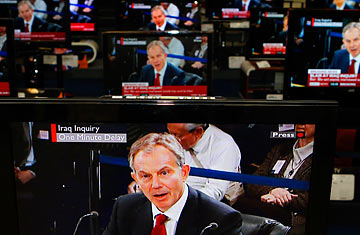
Former British Prime Minister Tony Blair is seen on television in an electrical store in Edinburgh as he gives evidence to the Iraq inquiry being held in London
Anyone who attended the Jan. 29 session of Britain's Iraq inquiry to watch Tony Blair crumble went home disappointed. When the nation's former Prime Minister returns to center stage, he seldom fails to remind even his sharpest critics of his prodigious political skills — the very same skills that had enabled him to cajole dubious colleagues and a skeptical Parliament into reluctantly supporting the 2003 invasion of Iraq. An inquiry panel of career diplomats and academics was never likely to dent his composure. ("They're sitting there like chickens," squawked an exasperated audience member during a break from proceedings.) Yet Blair's light grilling still produced a major eye opener: as opponents of the Iraq conflict waited in vain for an apology or some gratifying symptom of inner regret, Blair instead used the platform to argue for opening a new battlefront — against Iran.
The inquiry was established to learn the lessons of Iraq. Chief among these lessons is that dangerous regimes that may have weapons of mass destruction must be confronted, according to Blair, and he made sure the inquiry was in no doubt that Iran sits at the top of his personal axis of evil. "When I look at the way Iran today links up with terror groups ... a large part of the destabilization of the Middle East ... comes from Iran," he said. As for taking action to curb Iran's nuclear ambitions, that's "for the leaders of today to decide. My judgment is you don't take any risks with this issue," Blair added.
This was vintage Blair, linking his unpopular — and for many Britons, discredited — military adventure against a regime that proved as pathetic as it was pathological to the specter of a very different regime, one that is widely reviled by a substantial number of the human-rights activists and libertarians who most fiercely decry the Iraq war. And unlike Saddam Hussein's Iraq, Iran does have a nuclear program, although no hard evidence has yet been produced that it is using that program to produce weapons.
An interviewer for a BBC religious-affairs program broadcast last December asked Blair what he would have done if he had realized before the war that Saddam had no WMD. "I would still have thought it right to remove him," Blair replied. He refined that response — which could have been legally risky, since WMD, not desire for regime change, provided the official justification for British action — during his Iraq-inquiry testimony. "Sometimes what is important is not to ask the March 2003 question but to ask the 2010 question," he said. (Remember, the hallmark of a true politician is the ability to interview oneself.) "Supposing we had backed off this military action, supposing we had left Saddam and his sons, who were going to follow him, in charge of Iraq. He had used chemical weapons, caused the death of over a million people."
"What we now know is that he retained absolutely the intent and the intellectual know-how to restart a nuclear and a chemical-weapons program when the inspectors were out and the sanctions changed, which they were going to do," he continued. "Now, I think that it is at least arguable that he was a threat, that had we taken that decision to leave him there, with an oil price not $25 but $100 a bbl., he would have had the intent, he would have had the financial means, and we would have lost our nerve."
That analysis, combined with Blair's contention that the weapons inspectors had no chance of success no matter how much time they were given — not because there was nothing to find but because Saddam had no intention of cooperating with them, Blair argued in a piece of logic unlikely to assuage his critics — explains the former Prime Minister's unshakable tranquillity. Blair harbors "not a regret for removing Saddam Hussein," he told his inquisitors. "I believe he was a monster."
Of course, a monster is pretty much how protesters at the daylong hearing saw Blair himself. Besuited and wearing Blair masks smeared with stage blood, a trio of demonstrators held aloft a casket emblazoned with the motto "The Blood Price." Relatives of military casualties who had failed to secure seats in the hearing kept a vigil outside its doors, alongside an array of protesters who still feel the need to publicly express their anger over Blair's Iraq role. "I'm hoping he's going to live in the U.S.A. after this. Him and Bush are ... cronies, aren't they?" asked pensioner John Howsam, who braved icy rain to make his point.
The object of all this emotion isn't unmoved by it. But out of office, as in power, he is irrepressible. "In the end, [the war] was divisive, and I'm sorry about that," said Blair, in his single use of the S word during his testimony. But, he continued, "if I'm asked if we're safer and more secure [another question he put to himself], I believe indeed that we are."
— With reporting by Meg Handley in London
